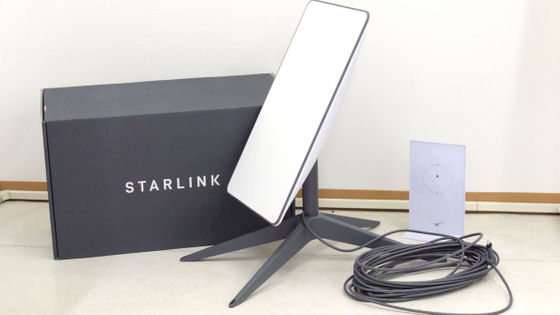SpaceX's satellite internet 'Starlink' kits are being sold to Russian military and Sudanese paramilitary groups via the black market

SpaceX's satellite internet service,
The Black Market That Delivers Elon Musk's Starlink to US Foes - WSJ
https://www.wsj.com/business/telecom/starlink-musk-ukraine-russia-sudan-satellite-communications-technology-f4fc79d9

Starlink terminals are reportedly being used by Russian forces in Ukraine
https://www.engadget.com/starlink-terminals-are-reportedly-being-used-by-russian-forces-in-ukraine-154832503.html
Russian, Sudanese Forces Are Secretly Buying Black-Market Starlink Dishes | PCMag
https://www.pcmag.com/news/russian-sudanese-forces-buying-black-market-starlink-dishes
The Starlink kit includes a white flat antenna, a router, and a cable, and you can use the internet anywhere you want by subscribing to a plan in advance. Therefore, Starlink provides a valuable internet environment in conflict zones where there is not enough ground infrastructure and on the front lines of wars where infrastructure has been destroyed.
Ukraine has already used Starlink for anti-tank bombing and drone control in the war with Russia, but Musk and SpaceX have expressed a negative view of Starlink's military use. SpaceX has reported that it has restricted the Ukrainian military's use of Starlink in 2023, and has stated that it will not conduct any transactions with the Russian government or military, and will not sell or ship Starlink terminals to Russia. If SpaceX receives information that a Starlink terminal is being used by a sanctioned or unauthorized person, it will investigate and disable the terminal if confirmation is obtained.
SpaceX does not do any kind of business with the Russian Government or its military.
— Starlink (@Starlink) February 8, 2024
Starlink is not active in Russia, meaning the service will not work in that country. SpaceX has never sold or marketed Starlink in Russia, nor has it shipped equipment to locations in Russia. If…
Russia and China have not approved the use of Starlink, citing the possibility that it could undermine national information control. However, the Wall Street Journal reported that the Russian military has acquired Starlink through the black market and is using satellite internet for military purposes.
Early in the war, the Russian military tried to establish its own communications system because its radio communications were subject to interference and interception by Ukraine, but it was unsuccessful and eventually began using Starlink on the front lines. The Russian military had been using Starlink since 2023, but in early 2024, Starlink was deployed more widely after it was discovered that 'a way to register Starlink terminals in other countries and use them in Russia' was discovered.
A Wall Street Journal investigation found that black market dealers in Africa, Southeast Asia, and the United Arab Emirates are making backroom deals to acquire thousands of Starlink kits and sell them to America's adversaries and military organizations. Dealers register the hardware in countries where Starlink is permitted, then sell the devices to countries where its use is prohibited. This allows countries and regions such as Russia, where Starlink service is not available, to connect to Starlink satellite internet.
In fact, a search on Russian search engine Yandex reveals numerous buyers selling Starlink kits online in Moscow and elsewhere, The Wall Street Journal reports. For example, Moscow-based online retailer shopozz.ru has sold dozens of Starlink terminals to the front lines of the war. A salesman for shopozz.ru who identified himself as 'Oleg' told The Wall Street Journal that most of the orders were for military use, either for use in Russian-occupied areas of Ukraine.
Another website, strlnk.ru, advertises that it will provide Starlink kits to Russian-occupied territories, including
It seems that many volunteers, not transporters, deliver Starlink terminals to soldiers on the front lines of the war. In February 2024, a person who called herself a volunteer, Valentina Kornienko, posted on the messaging app Telegram that she had delivered five Starlink terminals to the front line.
A 27-year-old major serving in the Ukrainian 92nd Brigade testified that he first saw the Russians using Starlink terminals in early 2024. 'They're mostly using newer models,' he said, telling The Wall Street Journal that the presence of Starlink antennas is evidence that drone pilots are nearby, so areas around the antennas will be a priority target for attack.
Ukrainian authorities have already contacted SpaceX about the Russian military's use of Starlink terminals and are working together to find a solution. On April 5, US Deputy Secretary of Defense John Plumb also said that SpaceX is working with Ukraine to stop Russia from using Starlink terminals on the front lines. In March 2024, Ukraine's communications regulator announced a decree requiring only Starlink terminals registered with Kyiv authorities to function in occupied territories and on the front lines, but it is unclear when this decree will come into effect and how it will be enforced.

Like Russia, Starlink has not been officially deployed in Sudan, where the Rapid Support Forces (RSF), a paramilitary organization that the United States has accused of humanitarian crimes and ethnic cleansing, has purchased a large number of Starlink terminals from a dealer in Dubai. The RSF, which is in conflict with the Sudanese national army, is using Starlink terminals to improve its command capabilities and recruit soldiers, as well as to raise funds.
Dubai dealers first start up Starlink terminals in Dubai, purchase roaming packages for the whole of Africa, and then export them to Sudan's neighboring countries, Chad and South Sudan. RSF, which obtained Starlink terminals smuggled into Sudan by land, is selling them in Sudan for $2,500 (about 380,000 yen) per unit, nearly five times the normal price. In addition, in some areas, it is said that they collect a fee of $500 (about 75,000 yen) per year from owners of Starlink terminals.
Because the RSF regularly destroys civilian communications infrastructure, some areas of Sudan cannot connect to the Internet in any way other than through Starlink. As a result, civilians who have acquired Starlink terminals are setting up makeshift Internet cafes and offering Internet access for a fee of $2 to $3 (about 300 to 450 yen) per hour.
Sudan's telecommunications regulator, which is concerned about this situation, complained about the increase in Starlink terminals in Sudan in a letter sent to SpaceX in January 2024. The authorities requested that SpaceX and the Sudanese government set up a joint team to allow the RSF to shut down the terminals deployed, but SpaceX did not respond. As a result, on January 31, the regulator issued a statement that it would impose penalties on Starlink users.
While Sudanese authorities are regulating Starlink devices in the country, they are also working to allow the military to acquire its own Starlink devices in order to undermine the RSF's advantage in internet connectivity. 'We have to have a backup plan,' a Sudanese intelligence adviser told The Wall Street Journal.
Related Posts:
in Web Service, Hardware, Posted by log1h_ik







